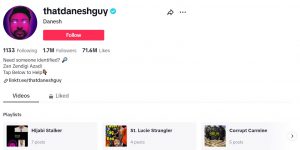Section 230 Applies to Doxxing TikTok Video–Couture v. Noshirvan
The court summarizes the plaintiffs’ allegations:
Defendant [Danesh] Noshirvan is a TikTok creator. He makes money through TikTok gifts, tips, and subscription fees. His niche is cancel culture. Noshirvan finds a video of someone messing up. He then edits and reposts the video. In the edited video, Noshirvan overlays himself doxing the person depicted in the video—that is, he provides the person’s name, contact information, employer, and other personal information. He targets the person as an antagonist, in need of accountability. Many of his millions of followers then harass the person. People pay Noshirvan for this doxing service.
[Note: I didn’t easily find Noshirvan’s alleged pay-for-doxxing service online, so I reiterate that the court’s summary remixes the complaint’s allegations and are not findings of fact.]
The allegations sound troubling. However, Noshirvan spins his efforts differently. He self-declares that he makes “content geared towards helping people who the police won’t help.” This makes him sound like a digital successor to the A-Team. That’s not necessarily a compliment. As we have seen over the decades, digital vigilantism can be legally risky and may create its own harms if the vigilante gets things wrong.
The plaintiffs became a target of Noshirvan’s efforts (again, these are the plaintiffs’ allegations):
Someone recorded Plaintiff Jennifer Couture during an argument. And someone then provided that video to Noshirvan and paid his fee. Noshirvan went to work. He edited the video and reposted his version targeting Couture. Many of his followers berated Couture by text and phone call. They found her family, the schools her children attended, and employers and contacted them. Over the next several months, Noshirvan posted twelve videos about Couture. He encouraged his followers to report Couture to Southwest Florida Crimestoppers. And he falsely reported to the Florida Department of Children and Families that Couture had harmed her child.
Noshirvan did not target only Couture. He also targeted Garramone Plastic Surgery (her employer and family). Garramone similarly received calls, texts, emails, and negative online reviews. Garramone responded to a negative review by stating that it was not from a former or current patient. Noshirvan then accused Garramone of slander and questioned why Garramone took out a PPP loan. Noshirvan’s videos forced Garramone to terminate contracts with surgeons who worried about reputational harm. Patients canceled scheduled procedures.
This narrative reminded me of the Dog Poop Girl incident from nearly 20 years ago. As you may recall, a South Korean woman didn’t pick up her dog poop on a public train–definitely a social faux pas, and perhaps a crime. However, after her omission was posted online and she was doxxed, she got canceled bigtime in ways that may have been disproportionate to her “crime.” I didn’t have the energy to find and watch Noshirvan’s first video covering Couture, but her description of the harms makes me wonder if her punishment is also disproportionate to whatever violations she committed in the argument.
Sadly, it now appears the parties are engaged in a long-term multi-front battle against each other. In this iteration of the feud, Couture and Garramone sued Noshirvan and TikTok for cyberstalking, civil conspiracy, and tortious interference.
 With respect to TikTok, superficially this looks like an obvious Section 230 dismissal. To get around Section 230, the plaintiffs suggested that TikTok’s monetization scheme contributed to the violation. This might be a potentially tenable workaround following the 9th Circuit’s Gonzalez v. Google ruling, which indicated that Section 230 may not apply to revenue-sharing arrangements. However, I’m not sure what is left of the Gonzalez case after the Supreme Court punted on the 230 questions.
With respect to TikTok, superficially this looks like an obvious Section 230 dismissal. To get around Section 230, the plaintiffs suggested that TikTok’s monetization scheme contributed to the violation. This might be a potentially tenable workaround following the 9th Circuit’s Gonzalez v. Google ruling, which indicated that Section 230 may not apply to revenue-sharing arrangements. However, I’m not sure what is left of the Gonzalez case after the Supreme Court punted on the 230 questions.
The attempted Gonzalez workaround fails here. The court says “Plaintiffs do not directly challenge TikTok’s monetization features.” Then the court says: “Nor do TikTok’s monetization features transform it into a developer rather than publisher of Noshirvan’s content…TikTok’s monetization features turn on the popularity of a video, not its content.” That makes the monetization features “neutral tools,” whatever that means. Allegations about TikTok’s scienter are irrelevant to Section 230.
Thus, citing McCall v. Zotos, the court concludes:
At bottom, TikTok’s role in the alleged wrongdoing was publishing Noshirvan’s content. So Section 230 bars Plaintiffs’ claims
Separately, the court dismisses all of the claims against Noshirvan.
Case Citation: Couture v. Noshirvan, 2023 WL 8280955 (M.D. Fla. Nov. 30, 2023). The CourtListener page.
An update on this case: 2025 WL 109339 (M.D. Fla. April 11, 2025). Another update: 2025 WL 2322740 (M.D. Fla. August 15, 2025)

